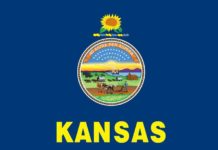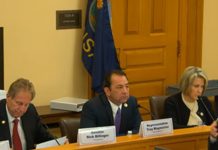(Updated to include comment from Kansas Chamber)
Gov. Laura Kelly on Wednesday quietly signed a bill cutting property taxes but vetoed another that would move the state toward a single income tax rate that she said favors “giveaways” to corporations and the wealthy over Kansas families.
With scant mention in a news release listing a package of bill signings, Kelly signed a bill eliminating the state’s 1.5-mill property tax levy that funds maintenance and renovations of some state buildings.
Brandon Woodard, the top Democrat in the House, noted during House debate that the 1.5-mill property tax cut would save the owner of a $150,000 home $25.88 and the owner of $230,000 home $39.68.
He said it would save the owner of a $500,000 home $86.25 and the owner of an $800,000 home $138, and for a $1.5 million home it would save $258.75.
“This bill is a step in the right direction to make housing more affordable for Kansans, but does nothing to provide the meaningful property tax relief that Kansans need,” Woodard said Tuesday night.
“The House has provided the Senate multiple opportunities to address rising property valuations,” Woodard said.
“However, the Republican-led Senate continues to focus on unserious proposals that negatively impact Kansans and do nothing to make it more affordable to live, work, and raise a family in Kansas.”
Meanwhile, the governor vetoed a second tax bill gradually moving the state to a single tax rate as income tax revenues beat inflation.
The bill gradually cuts individual income taxes to 4% when the state generates $5.96 billion dollars that come from income taxes plus inflation.
The legislation also would subsequently cut the tax rates for corporations as well as banks after individual income tax rates are reduced.
The bill passed 30-10 in the Senate and a 84-38 vote in the House. The Legislature ultimately overrode the governor’s veto later in the week.
“I have proposed and supported tax cuts when they are implemented responsibly and benefit the people of Kansas, especially those who need it most,” Kelly said in a statement.
“This bill ignores Kansas families at a time of rising costs and inflation in favor of hundreds of millions of dollars in giveaways to corporations and the wealthy.
“Make no mistake, should this bill become law, it will put the state back on the path toward the failed Brownback tax experiment: the four-day school weeks, the budget cuts, and the crumbling roads and bridges that came with it,” she said.
She said the income tax cuts in the bill could cost the state up to $1.3 billion annually, adding that the triggers for those cuts will kick in automatically regardless of any other economic factors or policy and budgetary considerations.
“We’ve been down this road before,” Kelly said.
“We can’t afford to go back to failed tax experiments and policies that will stifle economic opportunity for everyday Kansans and thwart efforts to ensure a sustainable water supply essential to our rural communities.”
The Kansas Chamber of Commerce, which backed the income tax plan, was eager for an override ride vote as early as Thursday.
“But thankfully, Kansans elected a veto-proof majority out of concern for increasing the take-home pay for Kansas families and Republican leaders have committed to doing just that.”
“We look forward to their attempt at a veto override and appreciate all the support of improving the cost of living and economic competitiveness of our great state.”
Individual income tax rates would be reduced first, with both tax rates reduced proportionally until the lower bracket reaches 4%, at which time only upper bracket rates would be reduced until the upper bracket rate reaches the same level.
When the individual rates hit 4%, surtax rate for corporations and the normal tax rates for financial institutions would start decreasing in corresponding amounts.
Those cuts would continue until the combined normal tax and surtax for corporations reached 4%, and the combined normal tax and surtax for banks reached 2.6%.
The state’s corporate rate is now 3.5% plus a 3% surcharge on taxable income over $50,000.
The combined normal tax and surtax for trust companies and savings and loan associations would be lowered until reaching 2.62%.
The bill contains a clause that would keep taxes from being lowered if the state’s rainy-day fund, which totals about $1.7 billion currently, dipped below 15% of state general fund tax receipts. It’s now at about 18%.















